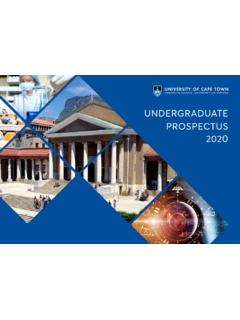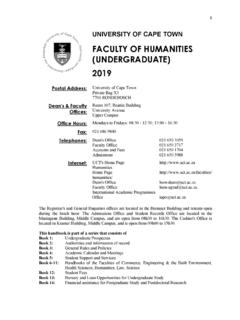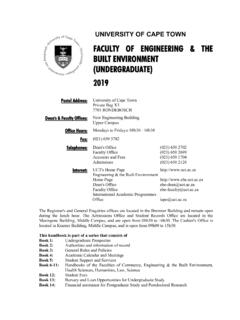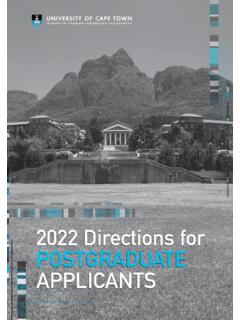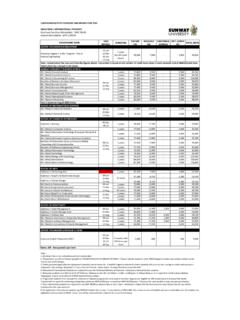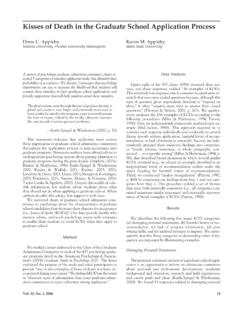Transcription of UNIVERSITY OF CAPE TOWN
1 UNIVERSITY OF CAPE TOWN FACULTY OF SCIENCE 2022 Postal Address: UNIVERSITY of Cape Town Private Bag X3 7701 RONDEBOSCH Dean's & Faculty Offices: Chris Hani Building UNIVERSITY Avenue North Road Upper Campus Office Hours: Mondays to Fridays: 08h30 - 16h30 Telephones: Dean's Office (021) 650 2711 Faculty Office (021) 650 2712 Accounts and Fees (021) 650 4076/2134 Admissions (021) 650 2128 Internet: UCT's Home Page Science Home Page Dean's Office Faculty Office International Academic Programmes Office The Admissions Office and Student Records Office are located in the Masingene Building, Middle Campus, and are open from 08h30 to 16h30.
2 The Cashier's Office is located in Kramer Building, Middle Campus, and is open from 09h00 to 15h30. This handbook is part of a series that consists of Book 1: undergraduate Prospectus Book 2: Authorities and information of record Book 3: General Rules and Policies Book 4: Academic Calendar and Meetings Book 5: Student Support and Services Book 6-11: Handbooks of the Faculties of Commerce, Engineering & the Built Environment, Health Sciences, Humanities, Law, Science Book 12: Student Fees Book 13: Bursary and Loan Opportunities for undergraduate Study Book 14: Financial assistance for Postgraduate Study and Postdoctoral Research SCIENCE FACULTY GENERAL CODE OF CONDUCT In keeping with UCT policy, the Science Faculty is dedicated to providing an environment that is inclusive and free of discrimination, violence, bullying and harassment for everyone, regardless of gender, race, sexual orientation, disability, country of origin, physical appearance, age, mental or physical health, HIV-status, political opinion or religion.
3 We do not tolerate discrimination, violence, bullying and harassment, in any form, towards our academic and PASS staff, postdocs, students or visitors. All communication should be professional and appropriate. This applies to general conduct in the Faculty, but also presentations and posters at conferences and in meetings, in laboratories, and in the field. Sexist, racist, and other exclusionary imagery and language including jokes are not appropriate and will not be tolerated. Violations of this code may be reported to staff within individual departments, and/or the Faculty, and/or the UCT Office for Inclusivity and Change, which could lead to possible disciplinary actions. In those cases the UCT Office for Inclusivity and Change (OIC) will hear both parties involved on the shortest possible notice.
4 Based on the outcome, further actions may be taken. UCT Transformation plans and policies, including a statement of values, plans and policies around employment equity, anti-discrimination and inclusivity, can be found here: The Science Faculty is mindful of the wide range of cultural backgrounds and expectations held by our academic and PASS staff, postdocs, students and visitors. Anyone who is uncertain about what is deemed appropriate behaviour should visit the above website and the resources and links therein. The UNIVERSITY has made every effort to ensure the accuracy of the information in its handbooks. However, we reserve the right at any time, if circumstances dictate (for example, if there are not sufficient students registered), to (i) make alterations or changes to any of the published details of the opportunities on offer; or (ii) add to or withdraw any of the opportunities on offer.
5 Our students are given every assurance that changes to opportunities will only be made under compelling circumstances and students will be fully informed as soon as possible. CONTENTS Guide to the Use of this Handbook .. 5 General Information .. 6 Officers in the Faculty .. 6 Senior Student Advisors in the Faculty .. 7 Student Advisors in the Faculty .. 7 Departments in the Faculty .. 8 Administrative offices dealing with student 9 Faculty Student Councils .. 9 Term dates for 2022 .. 9 Explanatory Notes on Course Codes .. 9 Essential Terminology .. 10 Degrees Offered in the Faculty .. 12 Rules for the degree of Bachelor of Science.
6 12 Rules for the degree of Bachelor of Science Honours (BSc Hons) .. 33 Rules for the degree of Master of Philosophy/Science .. 36 Rules for the degree of Doctor of Philosophy (PhD) .. 50 Rules for the degree of Doctor of Science .. 51 Departments in the Faculty .. 53 Department of Archaeology .. 53 Department of Astronomy .. 59 Department of Biological Sciences .. 67 Department of Chemistry .. 84 Department of Computer Science .. 94 Department of Environmental and Geographical Science .. 119 Department of Geological Sciences .. 144 Department of Mathematics and Applied Mathematics .. 151 Department of Molecular and Cell Biology .. 170 Department of Oceanography .. 177 Department of Physics .. 182 Department of Statistical Sciences.
7 191 Courses Offered by Departments in Other Faculties Towards Science Degrees .. 216 College of Accounting .. 216 Finance and Tax .. 216 Information Systems .. 217 Architecture, Planning and Geomatics .. 219 Electrical Engineering .. 220 Human Biology .. 221 Integrative Biomedical Sciences .. 224 Public Law .. 225 Inter-faculty Units .. 226 African Centre for Cities (ACC) .. 226 African Climate and Development Initiative (ACDI) .. 227 Electron Microscope Unit .. 228 Marine and Antarctic Research Centre for Innovation and Sustainability (MARIS) .. 229 Schedule of Courses .. 231 Courses by lecture period .. 239 Additional Information.
8 243 Distinguished Teachers in the Faculty .. 243 UCT Book Award .. 243 Prizes .. 244 Scholarships .. 245 Class Medals .. 245 Dean s Merit List .. 245 Minimum requirements for admission to an undergraduate degree .. 246 Non-Science electives in the Bachelor of Science (BSc) degree .. 246 GENERAL INFORMATION 5 GUIDE TO THE USE OF THIS HANDBOOK The following is a general overview of the structure of this Handbook for the guidance of users. The contents are organised in a number of different sections (see below) each of which has a particular focus. The sections are interlinked by cross-references where relevant. (a) General Information: This section includes information on the offices and staff in the Faculty with whom students may interact in the course of their studies, as well as explanatory notes on the course code system, terminology, term dates, etc.
9 (b) Degrees: This section lists the qualifications offered by the Faculty, as well as defining the rules for each of the various degrees. These rules should be read in conjunction with the general UNIVERSITY rules in the General Rules & Policies Handbook (Handbook 3). Students are expected to acquaint themselves with the rules in both Handbooks and to check annually whether the rules or curriculum requirements have changed since the last edition. The compulsory courses to be included in the curriculum of each undergraduate major offered in the Faculty are listed in this section. The areas of study or disciplines for postgraduate studies are included in the postgraduate degrees section. (c) Departments and Courses Offered: This section contains entries for each department in the Faculty.
10 Each section lists members of staff, the research areas and units and details of the courses offered and administered by each department. The detailed course information must be read together with the curriculum and degree information as noted above in section (b). (d) Schedule of Courses: The full list of undergraduate courses offered by the Faculty is set out in this section in alpha-numeric order ( based on the course code prefix) and includes lecture, practical and tutorial times together with course entry requirements for some courses. Another list groups courses by the semester and lecture period in which it is offered. (e) Additional Information: This section is at the back of this Handbook and includes lists of staff who are Fellows and Distinguished Teachers in the Faculty, as well as the various student prizes, class medals and scholarships awarded on academic merit and contains information on the criteria for the Dean's Merit List.
